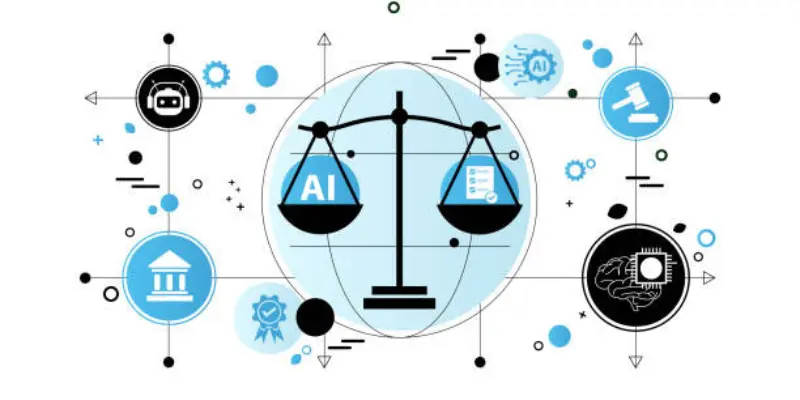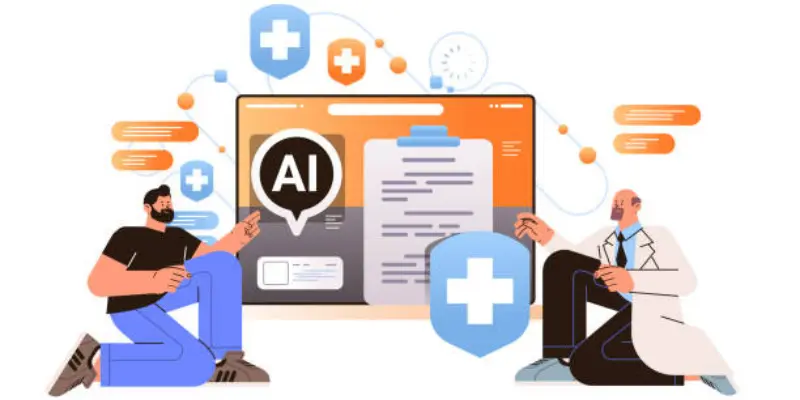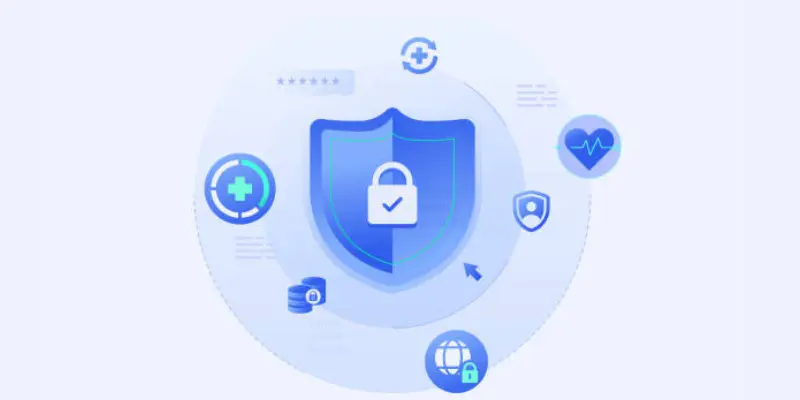A Complete Guide to The Ethics of AI in Healthcare
Published: 28 Apr 2025
AI in healthcare is transforming the way we approach medical care. From diagnosing diseases to managing patient records, artificial intelligence is making healthcare faster and more efficient. But as AI becomes a bigger part of healthcare, it’s important to think about its ethical use.
Why should we focus on ethics when using AI in healthcare? Well, AI can greatly impact patient privacy, fairness in treatment and even healthcare jobs. To make sure AI is used in the right way, healthcare providers need to address these ethical concerns. In this blog, we will explore the key ethical issues surrounding AI in healthcare and why they matter.

What is The Ethics of AI in Healthcare
Think of AI in healthcare like a new driver behind the wheel of a car. The car (AI) can take you places quickly and safely, only when the driver (humans) must follow the rules of the road to avoid accidents. The ethics of AI in healthcare is about making sure that the driver follows the rules to protect everyone in the car—patients, doctors and the healthcare system itself.
The ethics of AI in healthcare refers to the principles and guidelines that ensure AI systems are used responsibly, fairly and transparently. This includes making sure AI respects patient privacy, avoids bias and is used in ways that benefit everyone.
Ethics To Consider While Using AI in Healthcare
As AI continues to play a bigger role in healthcare, it’s crucial to think about how it affects patients, healthcare workers and the system as a whole. While AI can improve care and save time, we must make sure it’s being used ethically. That means we should focus on fairness, transparency and accountability.
In this article, I will light up the key ethical issues related to AI in healthcare, including:
- Privacy and Data Protection
- Bias and Fairness in AI
- Accountability in AI Healthcare Decisions
- Transparency in AI Systems
- The Impact of AI on Healthcare Jobs
- Informed Consent and Trust in AI Healthcare
Let’s explain each ethical consideration in some detail so that you have a better idea.
Suggested Article: Risks of AI Associated with Diagnosing Diseases
1). Privacy and Data Protection in Healthcare AI
What is Patient Data?
In healthcare, patient data refers to all the information about a person’s health, such as medical history, test results and personal details. This data is crucial for doctors to provide the best care but it’s also sensitive. If it falls into the wrong hands, it can cause harm.
The Risks to Privacy
AI in healthcare uses patient data to make decisions, like diagnosing illnesses or suggesting treatments. But there’s a risk: if the data is not protected properly, it could be accessed by hackers or misused. For example, imagine a hacker stealing private health records or a company selling patient data without consent.

How to Protect Patient Data in Healthcare AI
To protect patient privacy, healthcare providers must follow strict rules and use the latest technologies like encryption to secure the data. Encryption makes the data unreadable to anyone who is not authorized to access it. It’s also important to follow laws like HIPAA (Health Insurance Portability and Accountability Act) that set clear rules for handling patient data.
Tip: Always make sure that healthcare AI systems are regularly updated and comply with privacy laws. This helps in protecting sensitive information and builds trust with patients.
2). Bias and Fairness in Healthcare AI
What is Bias in AI?
Bias in AI happens when the system makes unfair decisions based on the data it’s trained on. Just like people, AI systems can “learn” from past examples. If the data used to train the AI is not diverse or balanced, the AI can favor one group over another, which is not fair.
How Does Bias Affect Healthcare?
In healthcare, bias in AI can lead to wrong diagnoses or treatment recommendations. For example, if an AI system is mostly trained on data from one ethnic group, it might not work as well for people from other groups. This can cause some patients to receive poorer care than others.

How to Reduce Bias in AI Healthcare
To make AI fair, healthcare organizations need to use diverse and representative data when training their AI systems. This means including different ages, genders, ethnicities and medical conditions in the data. It’s also important to regularly check AI systems to make sure they are working fairly for everyone.
Tip: Regular audits and using diverse datasets help to reduce bias in healthcare AI. This ensures better and more equal care for all patients.
3). Accountability in AI Healthcare Decisions
What is Accountability in AI?
Accountability means taking responsibility for actions. In healthcare, this means understanding who is responsible when AI makes a decision. If an AI system gives a wrong diagnosis or treatment suggestion, who is to blame? Is it the doctor, the AI company or someone else?
Why Does Accountability Matter?
Accountability is important because when lives are at stake, we need to know who is responsible if something goes wrong. AI can make mistakes just like humans. But if there’s no clear accountability, it could lead to confusion and lack of trust in AI systems.
Real-Life Example:
Imagine an AI system that suggests a treatment plan for a cancer patient. If the plan is wrong and the patient’s condition worsens, it’s important to know who is responsible. Was it the AI’s fault or did the doctor fail to review the suggestion properly? Clear accountability ensures that people can trust AI and know who to turn to for answers.
How to Ensure Accountability in AI Healthcare
To ensure accountability, healthcare organizations must set clear rules for how AI is used. This includes having human oversight in decision making and making sure doctors are trained to understand and check AI recommendations. The AI system should also be transparent, meaning it should explain how it made its decision.
Tip: Always have a clear process for reviewing AI decisions in healthcare. This keeps patients safe and ensures the right people are held accountable.
Also Read: How to Boost your Career in Healthcare
4). Transparency in AI Systems
What is Transparency in AI?
Transparency means being open about how something works. In AI, this means understanding how the system makes its decisions. If a doctor uses an AI tool to help with a diagnosis, they should be able to explain why the AI gave that suggestion and how it came to that conclusion.
Why Does Transparency Matter?
Transparency is key to building trust amongst the patients. If patients or doctors don’t understand how AI works, they may not feel comfortable relying on it for important decisions. When AI decisions are clear and understandable, it ensures that everyone feels confident in the technology.

Example:
Imagine a hospital using an AI system to help doctors choose treatments for heart patients. If the system suggests a specific treatment, the doctor should be able to explain why that treatment was recommended. For example, the AI might consider the patient’s age, medical history and test results. Transparency in this case means the doctor can explain the reasoning behind the decision to the patient, helping them feel more secure.
How to Improve Transparency in AI Healthcare
To improve transparency, AI systems should provide clear explanations for their decisions. Healthcare organizations can also create training programs to help doctors and nurses understand how the AI works. This will help healthcare professionals use AI tools more effectively and confidently.
Tip: When using AI in healthcare, always ask for an explanation of how the system came to its decision. This helps in ensuring clarity and builds trust with patients.
5). The Impact of AI on Healthcare Jobs
How Does AI Affect Healthcare Jobs?
AI is changing how healthcare workers do their jobs. While AI can make tasks faster and more accurate, some worry that it might replace certain jobs. For example, AI might assist doctors by reading medical images more quickly but it doesn’t mean doctors will lose their jobs. Instead, they can focus on more important aspects of patient care.
The Good Side of AI in Healthcare Jobs
AI can actually help healthcare workers by reducing the time spent on routine tasks. This means doctors and nurses have more time to spend with patients. AI might manage patient records, allowing doctors to spend more time on direct care.
Example:
In some hospitals, AI is already being used to assist radiologists by quickly analyzing medical images like X-rays and MRIs. The AI does not replace the radiologist but speeds up their work, helping them to make faster and more accurate diagnoses. This lets radiologists focus on more complex cases where human expertise is essential.
The Challenges AI Brings to Healthcare Jobs
However, there are also challenges. Some tasks like administrative work may be taken over by AI. This could mean fewer jobs in certain areas but it also opens the door to new roles. People will need to adapt by learning new skills to work alongside AI systems.
Tip: Healthcare workers should embrace training on AI tools. This helps them stay relevant in an evolving healthcare system and makes sure they can use AI to improve their work.
6). Informed Consent and Trust in AI Healthcare
What is Informed Consent?
Informed consent means that a patient understands and agrees to the medical treatment or procedures they will receive. In healthcare, this is especially important when using AI tools. Patients need to know how AI will be used in their care, what data will be collected and how decisions are made.
Why is Informed Consent Important with AI?
When AI is involved in healthcare decisions, it’s crucial that patients fully understand how the technology works. This makes them feel comfortable and confident with the care they are receiving. If patients don’t understand how AI is being used, they may feel uneasy or distrustful about their treatment.

Example:
Imagine a patient is being treated for a condition where AI is used to analyze their medical data and recommend treatments. Before any decisions are made, the doctor should explain to the patient how the AI works, what information it uses and the possible outcomes. This ensures that the patient feels informed and gives their consent willingly.
Building Trust in AI Healthcare
To build trust in AI healthcare, patients need to feel that their rights and privacy are respected. Healthcare providers should be open and clear about how AI is used and how data is handled. When patients trust that AI tools are being used responsibly, they are more likely to accept and benefit from the technology.
Tip: Always ensure patients are given enough information to make an informed decision. This will help to build trust and make them feel more comfortable with AI in healthcare.
How External Vendors Impact Patient Data Privacy
When healthcare providers work with external vendors for AI solutions, patient data privacy becomes a top concern. Since vendors handle sensitive medical information, it’s important to ensure that all data is kept safe and secure.
Vendor Responsibility in Data Protection
External vendors are responsible for maintaining the security of the patient data they handle. This means ensuring that the data is protected from unauthorized access, loss or misuse. Vendors must comply with privacy laws and regulations to ensure the data stays safe.
Data Encryption and Secure Storage
When patient data is shared with external vendors, it should always be encrypted. This means that the data is converted into a code that can only be accessed with the correct decryption key. Secure storage of patient data is also necessary to prevent unauthorized access.
Compliance with Privacy Regulations
Healthcare vendors must comply with privacy regulations like HIPAA in the U.S. or GDPR in the European Union. These regulations ensure that patient data is treated with the highest level of confidentiality and security. A healthcare provider partnering with an external AI vendor must ensure that the vendor follows HIPAA guidelines when processing patient data.
Vendor Audits and Monitoring
Regular audits of external vendors are essential to ensure they are following privacy and security protocols. Healthcare organizations should regularly monitor their vendors’ practices and have clear agreements in place about how data is managed and protected.
How to Maintain Patient Safety When Using AI in Healthcare
Patient safety is always the top priority in healthcare and this extends to using AI. While AI tools can improve healthcare outcomes, it’s essential to ensure they are used safely and responsibly to avoid harm to patients.

Ensuring AI Accuracy and Reliability
AI tools should be thoroughly tested before being used in real-world healthcare settings. This ensures that the technology functions as expected and provides accurate results. Regular updates and checks should also be conducted to maintain the system’s accuracy over time.
Regular Monitoring and Updates
AI systems must be monitored continuously to ensure they are functioning properly. Healthcare providers should establish a routine for checking AI systems just as they would for any other medical equipment. This helps to detect and correct issues before they affect patient care.
Human Oversight and Collaboration
AI is a tool, not a replacement for healthcare professionals. It’s important that AI tools are used alongside human expertise. Doctors and healthcare providers should always review AI results and use their own judgment when making decisions about patient care.
Recent Changes in Healthcare Regulations for AI: What You Need to Know
As AI continues to be integrated into healthcare, new laws and regulations are being introduced to ensure that patient care remains safe and that data privacy is protected. Understanding these changes is essential for healthcare providers, as they must adapt to comply with evolving rules and regulations.
New AI Regulations in Healthcare
Regulations around AI in healthcare are becoming stricter to protect patient safety and ensure ethical use of technology. New guidelines are focusing on making sure AI systems are tested for accuracy, transparency and bias before being widely adopted. These regulations aim to ensure that AI tools are safe, reliable and effective in a healthcare setting.
Example: In the U.S., the FDA has introduced guidelines for AI-based medical devices, requiring them to meet certain safety standards before they can be used in patient care. This ensures that the AI systems used for diagnosing or treating diseases meet the highest levels of safety.
Data Privacy Laws Getting Stricter
With AI using vast amounts of patient data, there has been an increase in privacy regulations to prevent misuse of sensitive information. New laws like the GDPR (General Data Protection Regulation) in Europe and updated HIPAA guidelines in the U.S. focus on ensuring data is protected with stricter penalties for non-compliance.
Tip: Healthcare organizations must stay updated on these evolving regulations to avoid legal consequences. Regularly reviewing data privacy practices and ensuring AI vendors are compliant with laws like GDPR and HIPAA is essential.
Increased Focus on Transparency and Accountability
Regulatory changes are pushing for more transparency in how AI systems make decisions in healthcare. New rules require healthcare providers to disclose how AI algorithms are used in patient care and to ensure accountability for any mistakes or failures.
Real-Life Example: According to reports, If an AI system makes a wrong diagnosis, healthcare providers must be transparent about the error and explain the role the AI played in the decision-making process. This helps to maintain trust with patients and ensures accountability.
Impact of AI on Licensing and Certification
With the rise of AI in healthcare, some regulatory bodies are also introducing new requirements for the licensing and certification of AI tools used in medical settings. Healthcare providers must ensure that any AI technology they adopt is approved by relevant authorities and meets the necessary standards for patient care.
Tip: When implementing new AI systems, healthcare providers should verify that the technology has the required certifications and approvals from regulatory bodies like the FDA.
Conclusion
So, guys! In this article, we covered Ethics of AI in Healthcare in detail. As AI continues to shape the healthcare landscape, it’s crucial for both healthcare providers and technology developers to prioritize ethics in their practices. In my opinion, staying up to date with regulations and ensuring patient safety should be the top priority. I encourage you to keep learning about these ethical concerns and always aim for a balance between innovation and responsibility. If you are in the healthcare field, take steps today to ensure AI implementation follows the right ethical guidelines.
FAQs About AI Ethics in Healthcare
Here are frequently asked questions that you might have in your database (Mind) 😊 :
Patients have the right to ask their healthcare providers if AI tools are being used in their care. Many facilities are now required to disclose this information as part of informed consent. You can always directly ask your doctor about what role, if any, AI plays in your treatment decisions.
Yes, several AI tools are already being used in healthcare settings, including radiology image analysis, medication management systems and predictive analytics for patient deterioration. These tools are typically used to support healthcare professionals rather than replace their judgment and adoption varies widely between facilities.
Ask your healthcare provider about their data protection policies and what third parties might access your information. Request information about how long your data is stored and whether it’s anonymized when used for AI training. You also have the right to review your medical records and in many cases can opt out of certain data sharing arrangements.
Training requirements for AI tools in healthcare vary widely depending on the institution and the specific technology. Some facilities provide comprehensive training programs while others may offer only basic orientation to the tools. As AI becomes more prevalent, many medical schools are beginning to incorporate AI literacy into their curricula.
Like any digital system, AI healthcare tools can potentially be vulnerable to cybersecurity threats. Healthcare organizations implement security measures like encryption and access controls to protect against unauthorized access. Regular security audits help identify and address potential vulnerabilities before they can be exploited.
Insurance coverage for AI-recommended treatments depends on your specific insurance policy and whether the treatment meets medical necessity criteria. Some insurance companies are beginning to incorporate AI into their own decision-making processes for coverage determinations. Always check with your insurance provider about coverage for specific treatments, regardless of whether AI was involved in the recommendation.
Studies show that AI diagnostic accuracy varies widely depending on the condition and the specific tool being used. Some AI systems have demonstrated accuracy comparable to or exceeding that of experienced specialists in specific, narrow tasks like analyzing certain medical images. However, AI typically lacks the broader contextual understanding and intuition that human doctors bring to complex cases.
AI has the potential to reduce healthcare costs by improving efficiency, reducing errors and identifying cost-effective treatments. Early detection capabilities of some AI systems may help to catch conditions when they are less expensive to treat. However, the initial investment in AI technology can be substantial and not all applications will necessarily lead to cost savings.
AI can identify patterns of healthcare disparities in large datasets that might otherwise go unnoticed. Some organizations are developing AI tools specifically designed to provide care in underserved areas or to monitor for bias in healthcare delivery. However, if not carefully designed with diverse data, AI systems risk perpetuating or even amplifying existing healthcare disparities.
AI is designed to support healthcare professionals, not replace them. The technology excels at specific tasks like pattern recognition and data analysis but lacks human empathy, ethical judgment and contextual understanding. The future of healthcare will likely involve collaboration between human providers and AI tools, with each contributing their unique strengths to patient care.





